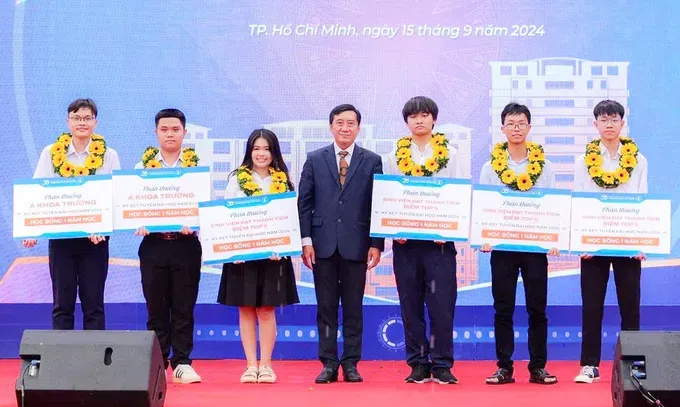
These new initiatives include tuition waivers, reductions, and scholarships, all designed to help students manage the increasing cost of higher education. By sharing the financial burden, universities aim to ensure that a quality education remains accessible to all.
Tuition fees on the rise
According to Ho Chi Minh City University of Law’s proposal, tuition fees for standard programs range from VND39.75 million (US$1,513) to VND47.17 million per year, an increase of 4.5 to 5.34 million compared with last year. For high-quality programs, fees range from VND79.5 million to VND199.7 million annually, up VND9 million to VND18.2 million from the previous year.
By the 2026–2027 academic year, tuition across all programs is expected to rise further, ranging from VND44.75 million to VND219.7 million per year.
Saigon University has drafted an autonomy plan and submitted it to the Ho Chi Minh City People's Committee. Starting with the 2025 intake, tuition for many programs will rise to 1.5 times that of the 2024 cohort. Most four-year programs, which previously cost VND65.8 million - VND70.1 million per course and VND109 million - VND114 million for high-quality programs, will increase to VND92 million-VND129 million in 2025.
For 4.5-year programs, tuition will rise from the current VND87 million–VND147 million to VND150 million–VND167 million. The university emphasizes that the new rates will only apply to students admitted in 2025, with no impact on earlier cohorts.
Meanwhile, the University of Economics Ho Chi Minh City announced that 2025 tuition fees will rise by more than VND200,000 per credit compared with 2024. Fees for Vietnamese-language programs will range from VND1.1 million to VND1.3 million per credit while English-language and practice-based programs will cost 1.2 to 1.4 times more. The university noted that tuition will continue to rise annually, although capped at no more than 10 percent per year.
At several member institutions of Vietnam National University Ho Chi Minh City, tuition fees for the 2025–2026 academic year will rise by about 10 percent under the autonomy roadmap. Specifically, at the University of Social Sciences and Humanities, tuition for standard programs ranges from VND14.46 million to VND33.8 million per year, while international programs are set at VND60 million annually.
At the University of Technology, tuition varies between VND30 million and VND80 million per year depending on the field of study, with the international joint bachelor’s program in engineering costing VND256 million annually.
Meanwhile, non-public universities continue to raise tuition fees, with increases ranging from 10 percent to 20 percent compared with last year. Annual tuition at these institutions typically ranges from VND20 million to VND200 million depending on the program of study.
Expanded financial support for students
To help ease tuition concerns, Vietnam National University Ho Chi Minh City has partnered with Asia Commercial Bank (ACB) to launch a financial aid program worth VND50 billion for full-time students across its eight member institutions. Under the scheme, students may borrow up to VND30 million per semester—or VND50 million per year. A key feature of the program is its accessibility that means loans require no collateral, involve simple procedures, and do not demand proof of income.
The loan scheme is particularly notable for its humanitarian approach: while the official interest rate is 5.5 percent per year, students pay only 2 percent, with the remaining 3.5 percent subsidized by the Vietnam National University Ho Chi Minh City Development Fund. In addition, member institutions are strengthening partnerships with domestic and international businesses to expand scholarship opportunities for students.
According to Associate Professor Nguyen Xuan Hoan, Rector of Ho Chi Minh City University of Food Industry, the university will offer a 50 percent tuition discount in the first semester of the 2025–2026 academic year for freshmen in majors such as Thermal Engineering, Nutrition and Culinary Science, Textile Technology, Fashion and Textile Business, and Natural Resources and Environmental Management. The university has also allocated VND60 billion to its scholarship fund to support policy beneficiaries and students from disadvantaged backgrounds who demonstrate good academic performance.
Vice Principal Le Trung Dao of Ho Chi Minh City University of Finance and Marketing announced that in the new academic year, the university will allocate VND50.5 billion for scholarship programs. These will support policy beneficiaries, high-scoring freshmen, disadvantaged students, and those with special talents. The university is also offering a wide range of merit-based scholarships and 'Lighting Dreams' awards through partnerships with businesses.
At a number of institutions including Nguyen Tat Thanh University, Ho Chi Minh City University of Economics and Finance, Van Hien University, and Ho Chi Minh City University of Technology—support for students extends beyond admission schedule.
























